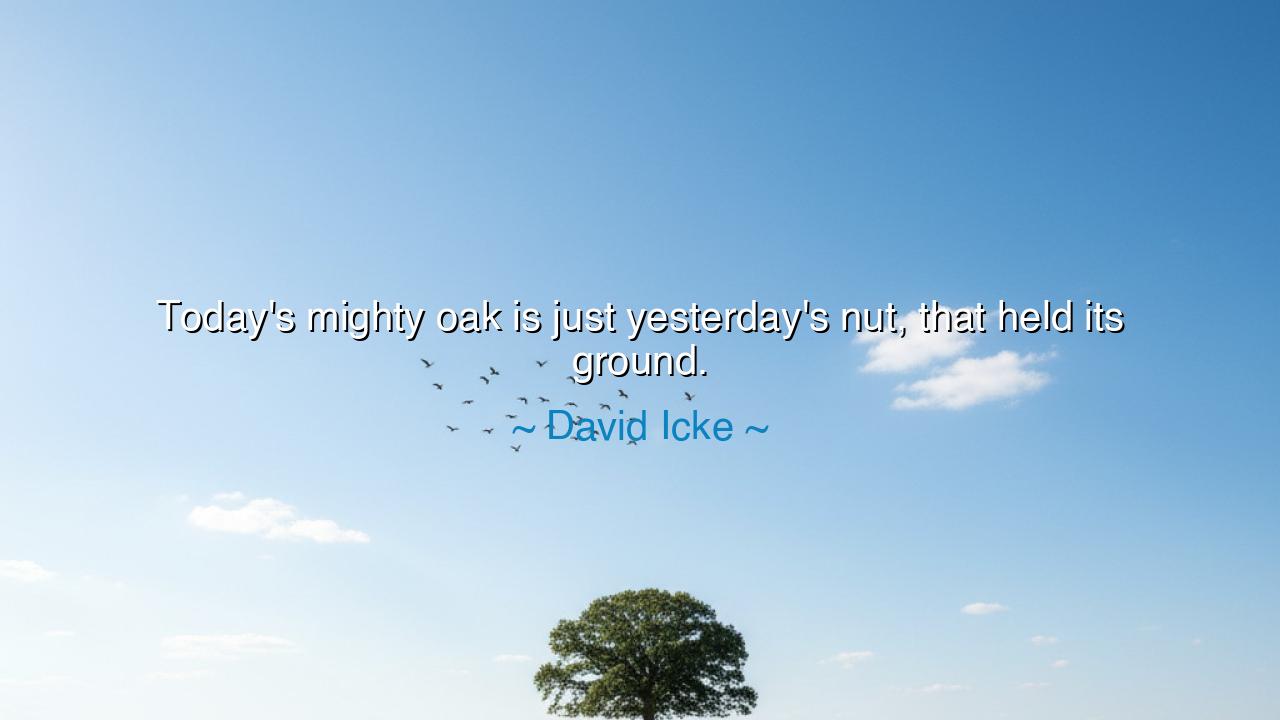
Today's mighty oak is just yesterday's nut, that held its






The words of David Icke, “Today's mighty oak is just yesterday's nut, that held its ground,” speak with the voice of nature itself. He reminds us that greatness is never born in its fullness, but begins in smallness, in fragility, in seeming insignificance. The mighty oak, towering above the forest, begins as nothing more than a humble nut, despised or overlooked by many. Yet by enduring storms, by refusing to yield, by sinking roots deep into the earth, it grows into majesty.
The ancients loved this image. They often likened the soul of man to a seed—small, vulnerable, yet holding within it the potential for greatness. The philosophers of Greece taught that character is not granted at birth, but cultivated, tested, and proven over time. Rome’s poets sang that the tree most battered by the winds grows roots most deep. Thus Icke’s words echo their wisdom: endurance is the secret that transforms weakness into strength.
History offers many examples. Consider Abraham Lincoln, mocked in his youth, dismissed as unrefined and awkward. To many, he was but a “nut,” an unlikely figure to shape a nation. Yet he held his ground, through failure, ridicule, and defeat, until he rose to guide America through its greatest trial. From the soil of rejection grew the oak of leadership and resolve, whose shade still shelters the generations.
Icke’s words also comfort those who are underestimated. Every visionary, every reformer, every artist who first stood alone against mockery or doubt was once the “nut” others laughed at. Yet the oak is proof that ridicule cannot kill the seed that refuses to abandon its ground. What matters is not the scorn of others, but the quiet strength to persist, to dig roots deeper when storms rage, and to grow steadily toward the light.
Let the generations remember: greatness begins in obscurity, and strength is forged in endurance. Today’s mighty oak is not a miracle of chance, but the triumph of resilience. Therefore, despise not the small beginnings, nor the humble seed. For he who holds his ground in the face of storms shall, in time, rise unshaken, offering shade and strength to others. The oak whispers this eternal truth: perseverance transforms weakness into majesty.






MHNguyen Thi Minh Hanh
On a personal level, I hear a call to tolerate looking foolish while skills compound. But “stick with it” is incomplete without quit rules. What’s your protocol? For example: set a horizon (six months), define leading indicators (skill milestones, user pull, joy), and precommit kill criteria (debt ceiling, burnout signs, ethical conflicts). Pair that with tiny daily anchors—thirty minutes of practice, one outreach, one reflection—so progress survives mood swings. How do you keep roots firm while letting branches adapt?
NHNgoc Huyen
The botanical metaphor inspires, but it can hide survivorship bias. Seeds don’t thrive on audacity alone; they need soil, water, time, and protection from being trampled. People, too, depend on infrastructure—education, healthcare, patience from employers or family. When we celebrate the one that made it, we risk ignoring the many that didn’t get support. What policies would widen the funnel—portable benefits, microgrants, public labs, open tooling—so persistence has a fair shot? I want perseverance stories that credit scaffolding, not just stoicism.
DSDainsleif Simp
There’s a social charge here: anyone who defies consensus risks being branded weird. Sometimes that stigma is just gatekeeping; sometimes it’s a warning about bad ideas. What safeguards let unconventional thinkers persist without giving harmful claims a free megaphone? I’m imagining norms like evidence thresholds, reversible experiments, and proximity to affected communities before scaling. Also, could we build public “skunkworks” spaces—small grants, mentorship, and ethical review—that protect eccentricity while filtering out grift? How do you strike that balance in practice?
LNNguyen Ly Na
I like the grit in this saying, but I worry about glorifying sheer obstinacy. How do you tell the difference between being early and being wrong? Are there heuristics—base rates, small bets, time-boxed trials—that help you persevere without digging a deeper hole? I’d love a framework that pairs resolve with feedback loops: what metrics show compounding progress, which red flags trigger a pivot, and how often should an outsider sanity-check the plan so conviction doesn’t harden into tunnel vision?